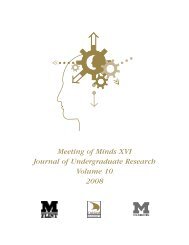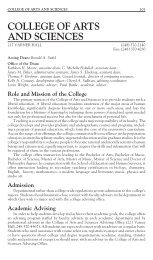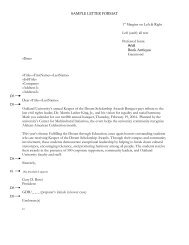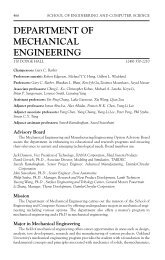MOM 2006 journal for pdf.pmd - University of Michigan-Flint
MOM 2006 journal for pdf.pmd - University of Michigan-Flint
MOM 2006 journal for pdf.pmd - University of Michigan-Flint
Create successful ePaper yourself
Turn your PDF publications into a flip-book with our unique Google optimized e-Paper software.
INHIBITION AND AGING: EVIDENCE FROM THE<br />
STROOP COLOR NAMING TASK IN ADULTS AGED 18 TO 90<br />
Nicole Cardiff<br />
Faculty Sponsor: Debra McGinnis<br />
Department <strong>of</strong> Psychology, Oakland <strong>University</strong><br />
Abstract<br />
Psychological research in aging suggests that older adults may experience declines in<br />
inhibitory processes. The Stroop task is among the measures used to study these processes<br />
(Stroop, 1935). The present study included data from 190 adults: 67 young adults aged 18-35, 60<br />
aged 60-74 (young-old), and 63 adults aged 75 and older (old-old). The present analysis focuses<br />
on two Stroop conditions that measure (1) susceptibility to interference (stating the color <strong>for</strong><br />
words printed in a different color) and (2) perseveration (stating the color <strong>for</strong> words when the<br />
target response was the suppressed response on the previous trial). Our results indicate a<br />
significant difference with old-old adult scores lower <strong>for</strong> both conditions than the other age<br />
groups. The relevance <strong>of</strong> our data to psychological theories pertaining to inhibition and aging<br />
will be highlighted, particularly as these are relevant to adults over 75 years.<br />
Introduction<br />
Since 1988, cognitive aging scientists have examined the viability <strong>of</strong> the Inhibition Hypothesis<br />
to explain various age-related declines in cognitive processes. The Inhibition Hypothesis states<br />
that as one ages there is a decline in the ability to suppress non-target in<strong>for</strong>mation. The inhibitory<br />
deficit hypothesis, states that as one ages their ability to inhibit irrelevant in<strong>for</strong>mation declines<br />
(Hasher & Zacks, 1988). In other words, older adults may have more problems suppressing<br />
irrelevant in<strong>for</strong>mation with the activation <strong>of</strong> this in<strong>for</strong>mation interfering with higher-order<br />
cognitive processes, such as comprehension or reasoning. One type <strong>of</strong> inhibitory problem<br />
pertains to susceptibility to random interference and a second type <strong>of</strong> inhibitory problem pertains<br />
to problems disassociating with in<strong>for</strong>mation that used to be relevant but must be ignored or<br />
suppressed <strong>for</strong> efficient processing to occur. In contrast, other theories suggest age-related<br />
declines in inhibition could be contributed to general slowing <strong>of</strong> the cognitive processes with age.<br />
This general slowing theory suggests that the aging process decreases response time. Thus, it is<br />
not a specific area <strong>of</strong> decline (like inhibitory processing) but a widespread decline in all areas due<br />
to the aging process.<br />
The Stroop task is one instrument used to examine inhibition (Stroop, 1935). The Stroop task<br />
consists <strong>of</strong> trials in which the individual is asked to identify the color <strong>of</strong> the word. The Stroop<br />
effect occurs when the response time is longer <strong>for</strong> trials in which the word and the color the word<br />
is presented in is different in comparison to trials that the word and the color <strong>of</strong> the word are the<br />
same. West & Alain (2000) studied the increase in the Stroop effect in older adults and<br />
hypothesized that impaired inhibitory processes, rather than general slowing, was responsible <strong>for</strong><br />
age-related declines in inhibition tasks. Their findings support the theory impaired inhibitory<br />
processes affected Stroop per<strong>for</strong>mance, rather than age-related slowing (general slowing).<br />
Meeting <strong>of</strong> Minds <strong>2006</strong> 4
















